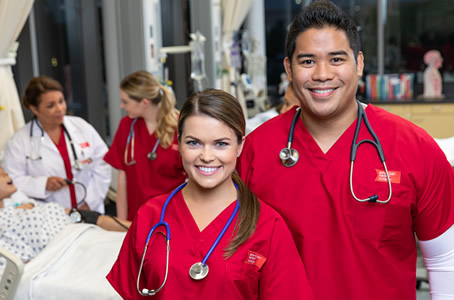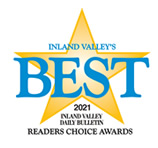- Home
- Programs[+]
- Getting Started[+]
- Why ACC[+]
- Locations[+]
- Newsroom[+]
- Contact Us

The Associate Degree in Nursing (ADN) program is designed to help you learn to use critical thinking, clinical reasoning and the nursing process to deliver evidence-based, patient-centered care for diverse patients in common and emerging health care settings.
Looking for the right RN degree program? ACC’s Associate Degree in Nursing program emphasizes hands-on training and real-world preparation. The ADN program helps prepare students with the knowledge to use informatics to communicate, access, monitor and evaluate patient data and become well trained registered nurses.
If you are looking to earn an associate degree at a nursing school or want to train to become a Registered Nurse (RN), American Career College is the right choice for you. The program is available at our Los Angeles and Ontario campuses.
This program is taught in a blended format combining online classes and in-person instruction.
Want to learn more about ACC?REQUEST MORE INFO Want to check out a campus?SCHEDULE A CAMPUS TOUR
"This was a most difficult yet exciting time of my life. But, I believed and then...I DID!"
It only takes a minute to take the next step towards a satisfying career! We've streamlined our online application. See for yourself!
A total of 99 quarter credits are required to earn the Associate Degree in Nursing (ADN), which includes completion of these courses:
The ADN program also requires clinical rotations in both inpatient and outpatient care settings.
Select courses in the Associate Degree in Nursing (ADN) program will be in a blended delivery format. Blended courses combine traditional or face-to-face classroom instruction with an online learning environment to optimize the learning experience of the user.
Using Dorothea Orem’s Theory of Self-Care, college students, in collaboration with interdisciplinary team members, assist patients through self-care deficits and health deviations as a part of the ADN degree program.
The Associate Degree in Nursing program is approved by the the California Board of Registered Nursing.
Board of Registered Nursing
1747 North Market Boulevard, Suite 150
Sacramento, CA 95834
Phone (916) 322-3350 / Fax (916) 574-7697
Our admissions advisors and financial aid advisors are here to support you. They can help you figure out the associate degree in nursing cost and help you explore financial aid options.
To learn more about ACC’s ADN program cost, access our tuition info.
Financial aid and scholarships are available for those who qualify.
Challenge/Advanced Placement into ADN Program for Military Personnel
Individuals who have held Military Health Care Training may be eligible to receive credit for previous education training. According to the ACC Catalog, “The College will conduct an evaluation of previous education and training for all Veterans and eligible persons, grant appropriate credit, shorten training period proportionally, and notify the Veterans Administration and student accordingly.”
Challenge Credit examinations may apply and will follow the processes outlined in the ACC Catalog.
The Associate Degree in Nursing program is available at the following campus: Los Angeles Associate Degree in Nursing program.
The accredited Associate Degree in Nursing training program is available at the following campuses:
Our ADN program helps prepare you for a variety of different healthcare settings. As an ACC graduate, you can speak to our Career Services team about your career goals and interests to get individualized help with career planning and job applications.
Here are some of the places you may work with an RN degree:
1 https://www.labormarketinfo.edd.ca.gov/OccGuides/detail.aspx?Soccode=291141&Geography=0601000000
An RN degree program helps you prepare for your licensure exam. In the state of California, all applicants for RN licensure must qualify for and pass the National Council Licensure Examination for Registered Nurses (NCLEX-RN), which relates to the practice of registered nursing in California.
Registered Nurses (RNs) provide and coordinate patient care, educate patients and the public about various health conditions, and provide advice and emotional support to patients and their family members. Here are some additional examples:
Some nurses have jobs in which they do not work directly with patients, but they must still have an active registered nurse license. For example, they may work as nurse educators, healthcare consultants, public policy advisors, researchers, hospital administrators, salespeople for pharmaceutical and medical supply companies, or as medical writers and editors.
* California Employment Development Department OCC Guide, Registered Nurses in California
The nursing program is divided into eight 10-week quarters and is in a blended format with each course sharing a percentage of instruction online and a percentage of instruction face-to-face. Graduates of this college program may pursue entry-level positions as Registered Nurses in a variety of health care settings. In addition to general education courses, core courses in American Career College's Associate Degree in Nursing program include:
Human Anatomy* - Provides an in-depth introduction to the physiology of the human body. Provides students an opportunity to study the functions and physiological mechanisms of several important organ systems from the molecular level to the body’s gross entirety. Organ systems are studied with respect to their interactions under normal and abnormal conditions. Major topics include cell function, tissues, organization of the human body, and physiology of all body systems.
General Microbiology* - Representative examples of bacteria, viruses, fungi, protozoa, and multicellular parasites are studied, with special concentration given to microorganisms that are significant to human health. Aspects of classification, metabolism, genetics, control mechanisms, chemotherapy, and antibiotic/resistance are considered. Topics covered include principles of infectious disease transmission, immunology, biotechnology, bioterrorism, and environmental remediation.
Fundamentals of Nursing* - The purpose of this course is to understand the practical science of nursing as it applies to caring for patients through the continuum from illness to wellness using Dorothea Orem’s Theory of Self-Care and the three important nursing systems: wholly compensatory, partial compensatory, and supportive-educative. The Nursing Process, legal and ethical considerations, patient rights and privacy, growth and development as related to the patient’s therapeutic self-care demands are introduced. This course also provides basic patient care skills and focuses on the essential principles and practices of safe, effective care in the multifaceted and multicultural nursing field.
Introduction to Psychology* - Introduction to scientific study of behavior, lifespan development, learning & cognition, personality, social interaction, psychotherapy, and other selected topics.
Introduction to Sociology* - This course questions basic sociological concepts, such as socialization and culture; social organizations; stability and change in societies; cooperation and conflict among human groups; religious, political, economic, technical, and scientific institutions. Sociological concepts and issues such as culture and subculture; development of the self; gender and age roles; social class and caste; groups, communities, collectives, and organizations; deviance; racism; human institutions: family, religion, education, government, economics; population change in society are discussed.
Advanced Medical/Surgical Nursing* - The purpose of this course is to present the principles of nursing care utilizing the nursing process and concepts of Orem’s Theory of Self-Care. The focus will include assessment, identifying the client’s universal self-care requisites: air, water, food, elimination, activity, social interaction, safety, and normalcy in the adult and geriatric patient. The three models of nursing systems recognized by Orem’s Nursing System Theory will be addressed: wholly compensatory, partial compensatory, and supportive-educative. Students will gain theoretical knowledge using the nursing process for patient-centered, evidence-based nursing care of adult and geriatric patients with critical health deviations related to sensory (neurological disorders, spinal cord injuries, CVA, brain tumors, and cranial surgeries) and cardiorespiratory disorders (acid-base balance, ARDS, COPD, VAP, pulmonary hypertension, tension, hemo, and pneumothorax, pulmonary edema, chest trauma, thoracic surgical, dysrhythmias, AMI, ACS, CHF, valve disease, and aneurysms), maintenance of central venous catheters and blood transfusions. Content threaded throughout the course includes cultural diversity, nutrition, pharmacology, patient advocacy, and physical, behavioral, and social aspects of human development.
Other core courses in the school's program include:
*Courses offered in a blended format, a combination of online and on ground.
Registered nurses work as part of a team with physicians and other healthcare specialists. Some registered nurses oversee licensed practical nurses, nursing assistants, and home health aides.
As a registered nurse, responsibilities may include the following*:
Registered Nurses' duties and titles often depend on where they work and the patients they work with. They can focus in the following areas1:
Registered nurses may also work to promote general health, by educating the public on warning signs and symptoms of disease. They may also run general health screenings or immunization clinics, blood drives, or other outreach programs.
* California Employment Development Department OCC Guide, Registered Nurses in California
1Bureau of Labor Statistics, U.S. Department of Labor, Occupational Outlook Handbook, Registered Nurses
ACC’s ADN program is designed to provide a comprehensive nursing education that combines foundational knowledge with hands-on clinical experience. Over the course of the program, you will learn the essential skills needed to become a registered nurse.
ACC helps prepare graduates to take the NCLEX-RN with confidence to attain their RN licensure. With dedicated faculty guidance, hands-on training, and a curriculum aligned with the exam's content, our ADN program sets you on a path to success.
Registered nurses are integral to a thriving healthcare ecosystem. RN responsibilities include, but are not limited to:
Find a registered nurse school near you. The Associate Degree in Nursing program is available at our Los Angeles and Ontario campuses.
Often called the backbone of the healthcare industry, registered nurses (RNs) provide and coordinate patient care, playing an essential role in their treatment and recovery. Students in ACC’s Associate Degree in Nursing program will be trained to do the following:
If you have a passion for helping others in their time of need, nursing might be right for you. Here are some of the top skills and attributes that make for a great registered nurse:
Service orientation – A great nurse has a passion for helping patients and for providing the best care possible.
Communication – Nurses must be able to communicate accurately with patients, doctors and fellow nurses.
Critical thinking – Nurses use critical thinking skills to make decisions on the job and find solutions.
Time management – Time management helps nurses balance their different tasks and provide timely care when needed by their patients.
Customer and personal service – Nurses provide more than just physical care. They provide emotional support for their patients. Good customer and personal service skills can help them provide better patient-centered care.
Registered nurses can work in a variety of settings, including:
Graduates of the Associate Degree in Nursing (ADN) program may pursue a variety of nursing positions. Here are some additional examples:
Addiction nurses care for patients who need help to overcome addictions to alcohol, drugs, tobacco and other substances.
Cardiovascular nurses care for patients with heart disease and people who have had heart surgery.
Critical care nurses work in intensive care units in hospitals, providing care to patients with serious, complex and acute illnesses and injuries that need very close monitoring and treatment.
Genetics nurses provide screening, counseling and treatment of patients with genetic disorders, such as cystic fibrosis.
Neonatology nurses take care of newborn babies.
Nephrology nurses care for patients who have kidney-related health issues stemming from diabetes, high blood pressure, substance abuse or other causes.
Rehabilitation nurses care for patients with temporary or permanent disabilities.
This is a 20-month associate degree program. The ADN program is composed of eight 10-week quarters.
Upon completion of the program, you can apply to the state to take the NCLEX-RN exam. Once you have passed the NCLEX-RN exam, you will receive your RN from the state.
No pre-requisite classes are required. All general education and core nursing classes are included in the program.
No, the ADN program is currently only offered as a full-time program.
A high school diploma or completion of a High School Equivalency program is required to apply.
All applicants are required to take the HESI exam, which consists of three sections: Math, Reading Comprehension and Science. A score of 75% or higher is required for admission. If the applicant does not achieve a passing score on the second attempt on the HESI exam, they must wait three months from the date of the last attempt to take the HESI a third time and would be applying for admission to the next cohort.
Information regarding how to obtain this clearance will be given to the applicant during the admissions interview. Health screening examinations, pathology tests (if applicable), drug testing, and/or immunizations for the associate degree programs are conducted on campus prior to clinical assignments. A background check is done after enrollment. Though a prior background will not prevent you from starting the program, depending on the offense, it could prevent placement at a clinical site and present difficulty obtaining your license.
No, this is not a completion or bridge program.
ACC has a transfer policy to review transcripts to assess if credits will be transferred. We cover this in more detail in our info sessions. You may schedule an info session to learn more and speak with an admissions advisor.
View the ADN program start date calendar to learn more.
*Each class has a set number of seats available and it is possible that classes can be filled in advance of a start date. You may schedule an info session here to learn more and speak with an admissions advisor.
Not entirely. Some of the courses are offered in a blended format combining online classwork with in-person labs.
The nursing program is divided into eight 10-week quarters and is in a blended format with each course sharing a percentage of instruction online and a percentage of instruction face-to-face. Graduates of this college program may pursue entry-level positions as registered nurses in a variety of health care settings. In addition to general education courses, core courses in American Career College's Associate Degree in Nursing program include:
Human Anatomy* – Provides an in-depth introduction to the physiology of the human body. Provides students an opportunity to study the functions and physiological mechanisms of several important organ systems from the molecular level to the body’s gross entirety. Organ systems are studied with respect to their interactions under normal and abnormal conditions. Major topics include cell function, tissues, organization of the human body and physiology of all body systems.
General Microbiology* – Representative examples of bacteria, viruses, fungi, protozoa and multicellular parasites are studied, with special concentration given to microorganisms that are significant to human health. Aspects of classification, metabolism, genetics, control mechanisms, chemotherapy and antibiotic/resistance are considered. Topics covered include principles of infectious disease transmission, immunology, biotechnology, bioterrorism and environmental remediation.
Fundamentals of Nursing* – The purpose of this course is to understand the practical science of nursing as it applies to caring for patients through the continuum from illness to wellness using Dorothea Orem’s Theory of Self-Care and the three important nursing systems: wholly compensatory, partial compensatory and supportive-educative. The Nursing Process, legal and ethical considerations, patient rights/privacy, growth and development as related to the patient’s therapeutic self-care demands are introduced. This course also provides basic patient care skills and focuses on the essential principles and practices of safe, effective care in the multifaceted and multicultural nursing field.
Introduction to Psychology* – Introduction to scientific study of behavior, lifespan development, learning & cognition, personality, social interaction, psychotherapy and other selected topics.
Introduction to Sociology* – This course questions basic sociological concepts, such as socialization and culture; social organizations; stability and change in societies; cooperation and conflict among human groups; and religious, political, economic, technical and scientific institutions. Sociological concepts and issues such as culture and subculture; development of the self; gender and age roles; social class and caste; groups, communities, collectives and organizations; deviance; racism; human institutions: family, religion, education, government, economics and population change in society are discussed.
Advanced Medical/Surgical Nursing* – The purpose of this course is to present the principles of nursing care utilizing the nursing process and concepts of Orem’s Theory of Self-Care. The focus will include assessment, identifying the client’s universal self-care requisites: air, water, food, elimination, activity, social interaction, safety and normalcy in the adult and geriatric patient. The three models of nursing systems recognized by Orem’s Nursing System Theory will be addressed: wholly compensatory, partial compensatory and supportive-educative. Students will gain theoretical knowledge using the nursing process for patient-centered, evidence-based nursing care of adult and geriatric patients with critical health deviations related to sensory (neurological disorders, spinal cord injuries, CVA, brain tumors and cranial surgeries) and cardiorespiratory disorders (acid-base balance, ARDS, COPD, VAP, pulmonary hypertension, tension, hemo, and pneumothorax, pulmonary edema, chest trauma, thoracic surgical, dysrhythmias, AMI, ACS, CHF, valve disease and aneurysms), maintenance of central venous catheters and blood transfusions. Content threaded throughout the course includes cultural diversity, nutrition, pharmacology, patient advocacy, and physical/behavioral/social aspects of human development.
Other core courses in the school's program include:
College Mathematics I*
Professional Communication & Role Transition Seminar
Human Physiology*
Fundamentals of Nursing, Clinical
For a complete description of coursework in these modules, please refer to the ACC Catalog.
Our admissions advisors and financial aid advisors are here to support you. They can help you figure out the ADN school cost and help you explore financial aid options.
To learn more about ACC’s Associate Degree in Nursing program cost, access our tuition info.
Yes, financial aid and scholarships are available to those who qualify. We have financial aid advisors that can provide you with information regarding financial aid options ranging from government-backed loans, private loans, scholarships, support for members of active-duty military, and employer reimbursement. All financial aid options are subject to student eligibility. You would need to apply to determine what you qualify for.
You can call (877) 832-0790 or click here to schedule a virtual info session to learn more about the Associate Degree in Nursing program.
Yes! ACC's ADN program includes over 800 hours of clinicals, giving students the opportunity to demonstrate and reinforce the knowledge and skills they acquired learning hands-on throughout the training program.

Ontario Campus: Voted Best Trade School in the 2021 Inland Valley Daily Bulletin Readers Choice Awards

LA Campus: Voted Favorite Career College in the 2021 LA Daily News Readers Choice Awards.

OC Campus: Voted Best Career College in the 2021 San Gabriel Valley Tribune Readers Choice Awards.
Personal Information you submit through our Sites, such as your name, address and other contact information, may be collected by American Career College for internal marketing and development purposes as well as to respond to your inquiry, complete a transaction for you, or fulfill other forms of customer service. You can choose not to receive marketing from us by "unsubscribing" using the instructions in any marketing email you receive from us.
